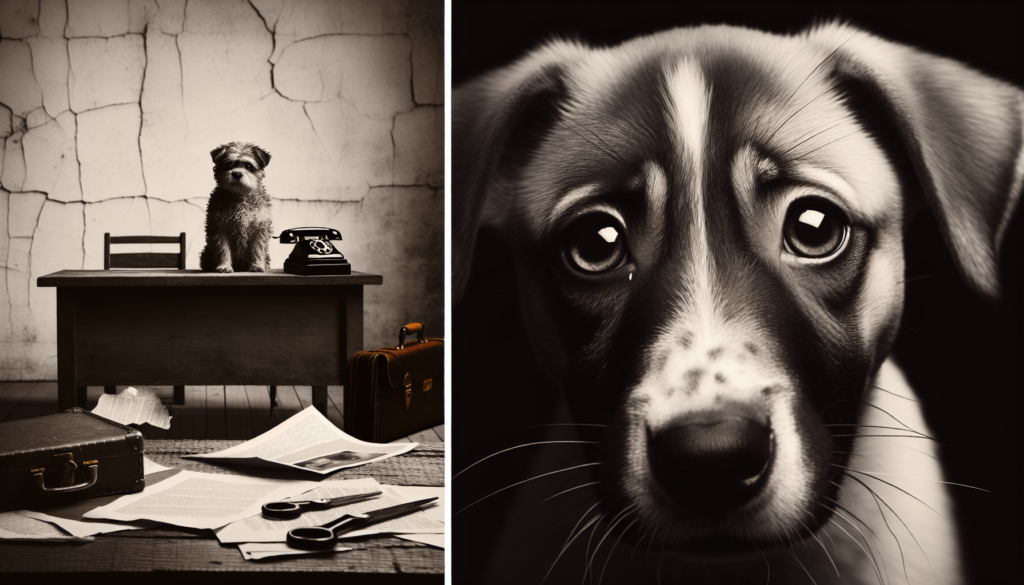Whether you have a lovable Labrador, a graceful Persian cat, or a chirpy parakeet, our furry and feathery companions play a vital role in our lives. However, when it comes to divorce, the impact on our loyal pets is often overlooked. We often worry about the emotional effect on children, but what about our four-legged friends? In this article, we will explore the often underestimated consequences of divorce on our beloved pets and what we can do to minimize their distress during this challenging time.
Emotional Impact on Pets
Changes in Routine and Environment
Divorce often brings significant changes in routine and environment for pets. Suddenly, the familiar daily schedule is disrupted, resulting in uncertainty and confusion. Dogs, for example, are creatures of habit, and any deviation from their usual routine can be distressing. Even small changes like different meal times or a different walking schedule can affect their emotional well-being. Cats, too, thrive on familiarity, and abrupt changes in their environment can cause stress and anxiety.
Separation Anxiety
One of the most common emotional challenges pets face during divorce is separation anxiety. Dogs, in particular, are known to form strong bonds with their humans and can feel a deep sense of loss when their owners separate. Symptoms of separation anxiety may include excessive vocalization, destructive behavior, and even physical ailments. Cats, though more independent, can also experience separation anxiety and exhibit behavioral changes such as increased hiding or excessive grooming.
Depression
Divorce can lead to depression in pets, just as it does in humans. The loss of the stable family unit and the absence of one of their owners can take a toll on their emotional well-being. Pets may become lethargic, lose interest in their favorite activities, and even withdraw from social interactions. It is crucial to recognize these signs of depression in pets and provide them with the support and love they need during this challenging time.
Behavioral Changes
Divorce can trigger various behavioral changes in pets. They may become more agitated, show signs of aggression, or start exhibiting destructive behavior. Some pets may also engage in excessive licking, chewing, or scratching as a way to cope with their anxiety or stress. It is essential to address these behavioral changes promptly and seek professional help if necessary to ensure the well-being of both the pets and their owners.
Physical Impact on Pets
Neglect and Lack of Care
During a divorce, pets may unintentionally suffer from neglect and lack of care. With both owners going through the emotional turmoil of the separation, their focus may shift away from providing the necessary attention and care to their furry companions. This unintentional neglect can result in a decline in the pet’s physical health and overall well-being.
Health Issues
Pets may also develop physical health issues as a result of the stress and changes associated with divorce. Just as humans can experience a weakened immune system during periods of emotional strain, pets are susceptible to the same. This can leave them vulnerable to illnesses and infections. Additionally, the stress that comes with divorce may exacerbate pre-existing health conditions, leading to a deterioration in their overall health.
Weight Loss or Gain
Divorce can disrupt a pet’s eating habits, leading to fluctuations in weight. Some pets may experience a loss of appetite, leading to weight loss and potential malnutrition. Others may turn to food for comfort, leading to weight gain and potential obesity. Both extremes can have adverse effects on the pet’s physical health and vitality. It is crucial for owners to monitor their pets’ eating habits and consult a veterinarian if noticeable changes occur.
Decreased Exercise
The emotional strain of divorce can also result in decreased exercise for pets, leading to a sedentary lifestyle. Dogs may have fewer walks or play sessions, which can result in weight gain and muscle loss. Cats may become less active and engage in less play, leading to weight gain and decreased muscle tone. Regular exercise is vital for pets’ physical and mental well-being, and finding ways to incorporate it even during a challenging time can greatly benefit their overall health.

Changes in Ownership and Living Arrangements
Custody Battles
Sometimes divorce can lead to custody battles over pets, which can have a significant impact on their well-being. Pets may be caught in the middle of disputes, causing them additional stress and uncertainty. Frequent changes in living arrangements and uncertainty about their primary caregiver can be overwhelming for pets, who thrive on stability and routine. It is essential for divorcing couples to prioritize the best interests of their pets when navigating custody battles.
Rehoming or Surrendering
In some cases, divorce may result in the difficult decision to rehome or surrender pets. This can be an emotionally challenging choice for both the owners and the pets involved. Being separated from their beloved family can lead to a sense of loss and disorientation for pets. It is crucial to explore alternative options, such as seeking the assistance of rescue organizations or finding trusted friends or family members who can provide a loving home.
Adjusting to New Homes
Pets may struggle to adjust to new homes during and after a divorce. The sudden change of environment can be disorienting and stressful for them. They may need time to acclimate to new living spaces, new routines, and potentially new caregivers. Providing a calm, safe, and predictable environment can greatly help pets in their adjustment process and alleviate some of the anxiety they may experience.
Loss of Familiarity
Divorce often means a loss of familiarity for pets. They may no longer have access to their familiar surroundings, such as their favorite lounging spots or the backyard they used to roam in. Additionally, they may lose contact with extended family members or friends who were once part of their lives. These losses can contribute to a sense of insecurity and can be emotionally challenging for pets. Offering them reassurance, love, and familiar belongings can help ease their transition.
Financial Impact on Pets
Increased Veterinary Costs
Divorce can lead to increased veterinary costs for pets. As couples separate, the financial responsibility for pet care may change, and additional expenses can arise. Veterinary care, including routine check-ups, vaccinations, and potential health issues, can significantly impact the finances of divorcing individuals. It is important to consider the financial well-being of the pets when making decisions during a divorce and to ensure that their medical needs continue to be met.
Additional Supplies and Expenses
Maintaining the well-being of pets after a divorce may require additional supplies and expenses. This includes items such as food, treats, grooming products, bedding, and toys. Divorcing couples may need to adjust their budgets to accommodate these added costs and ensure that their pets enjoy a comfortable and happy life despite the changes taking place.
Affecting the Quality of Pet Care
Financial constraints resulting from a divorce can inadvertently affect the quality of pet care. When individuals are grappling with the financial implications of separation, they may be tempted to cut corners or compromise on the level of care they provide for their pets. This can impact everything from the type of food they can afford to the availability of necessary veterinary treatments. Recognizing this potential impact and finding resources to support pet care during this challenging time is crucial.
Potential Neglect due to Financial Constraints
In extreme cases, financial constraints resulting from divorce can lead to neglect or inadequate care for pets. Divorcing individuals may face tough choices between paying for their own essentials or providing for their pets. Unfortunately, this can result in a decline in the pet’s well-being and even jeopardize their overall health and safety. Seeking assistance from community resources or organizations that provide financial aid for pet care can help address these challenges and prevent neglect.

Legal Rights and Protections for Pets
Lack of Legal Status
Pets are often considered property under the law, which can limit their legal rights and protections during a divorce. This can result in unfavorable outcomes for pets and their well-being. As understanding grows about the emotional depth and value of animals, there is a growing movement to advocate for legal recognition of pets as more than mere property. This change would allow for better protection and consideration of their interests in divorce proceedings.
Determining Pet Custody
Determining pet custody during a divorce can be a challenging and emotionally charged process. Unlike children, there are no statutory factors or legal standards commonly applied in determining pet custody. The lack of clear guidelines can lead to disputes and additional stress for both the divorcing individuals and the pets involved. Exploring alternative dispute resolution methods, such as mediation or collaborative law, can help divorcing couples find mutually agreeable solutions.
Advocacy for Animal Rights
The impact of divorce on pets has spurred advocacy for stronger animal rights and protections. Organizations and individuals are working to raise awareness about the emotional well-being and rights of animals involved in divorces. Through education, lobbying, and public campaigns, they seek to bring attention to the unique needs of pets and to promote legal changes that prioritize their best interests.
Emerging Legislation and Changes
As society becomes increasingly aware of the emotional impact divorce has on pets, legislation is slowly evolving to address their unique needs. Some jurisdictions have started to implement laws that explicitly consider the welfare of pets during divorce proceedings. These changes signify a larger shift in recognizing pets as family members who deserve special consideration and protection during challenging times.
Supporting Pets and Their Owners During Divorce
Professional Counseling and Therapy
Professional counseling and therapy services can provide invaluable support for both pets and their owners during divorce. Animal behaviorists or pet therapists can help pets navigate the emotional challenges they face, provide coping strategies, and assist owners in understanding their pet’s needs. Additionally, individual or family therapy sessions can help divorcing individuals cope with their emotions while ensuring they provide the best care and support for their pets.
Pet Visitation and Co-parenting
Pet visitation and co-parenting arrangements can be beneficial for both pets and their owners. Similar to child custody arrangements, setting up structured visitation schedules allows pets to maintain a connection with both owners. This can provide stability, familiarity, and love, helping to ease the emotional impact of divorce on pets. Coordinating and communicating effectively with the other owner is crucial to ensure the well-being of the pets involved.
Providing Stability and Routine
Providing stability and routine is essential for pets going through a divorce. Maintaining consistency in feeding, exercise, and play schedules can help alleviate anxiety and promote a sense of security. Additionally, keeping pets in a familiar environment, such as the family home, whenever possible can provide much-needed stability, especially during times of transition.
Educating Pet Owners on Coping Strategies
Educating pet owners on coping strategies is crucial to support them and their pets through the challenges of divorce. Sharing resources, articles, or books on topics like separation anxiety, behavior management, and creating a pet-friendly environment can empower owners with the knowledge and tools needed to navigate their pets’ emotional well-being effectively. Through education, pet owners can develop strategies to minimize the impact of divorce on their beloved companions.
Important Considerations for Pet Owners
Including Pets in Divorce Agreements
Pet owners should consider including pets in their divorce agreements whenever possible. By explicitly addressing the care, custody, and visitation arrangements for pets, divorcing individuals can prioritize their pets’ well-being and define their ongoing responsibilities. This can help avoid disputes and ensure that the pets’ best interests are consistently considered throughout the divorce and beyond.
Prioritizing the Animal’s Welfare
Throughout the divorce process, it is crucial for pet owners to prioritize the welfare of their pets. This includes making decisions that are in their pets’ best interests, even if it means setting aside personal preferences. By consistently putting the needs and emotional well-being of their pets first, pet owners can provide a foundation of love and support that helps their companions navigate the challenges of divorce.
Seeking Legal Advice on Pet Custody
Seeking legal advice on pet custody is recommended when going through a divorce. Consulting a family law attorney experienced in handling pet-related matters can provide guidance on legal options and potential strategies for resolving custody disputes. An attorney can help pet owners understand the relevant laws and negotiate fair arrangements that prioritize the pets’ best interests.
Being Mindful of Children and Pets
Divorce is a challenging time for both children and pets. Being mindful of the interactions and dynamics between children and pets is crucial during this period of emotional transition. Encouraging positive interactions, educating children about the needs and emotions of their furry companions, and fostering empathy and love for animals can help create a supportive environment for both children and pets during and after a divorce.
Community Resources for Pet Owners
Animal Shelters and Rescue Organizations
Animal shelters and rescue organizations can be valuable resources for pet owners going through a divorce. They can provide information, support, and potential solutions for pet rehoming or temporary foster care. By reaching out to these organizations, pet owners can explore alternative options and ensure that their beloved companions are well-cared for during this transitional period.
Pet-Friendly Housing Options
Finding pet-friendly housing options can be a challenge for divorcing individuals. Fortunately, there are resources available to help connect pet owners with rental properties or housing communities that welcome pets. Online platforms and local animal organizations often maintain lists of pet-friendly housing options, making it easier for individuals to find suitable accommodations for themselves and their pets.
Support Groups for Divorcing Pet Owners
Support groups specifically tailored for divorcing pet owners can provide empathy, understanding, and guidance during this challenging time. Sharing experiences with others who are going through similar circumstances can foster a sense of camaraderie and support. Peer support can offer practical advice, emotional validation, and encouragement, allowing pet owners to navigate divorce with their pets’ best interests in mind.
Financial Assistance Programs for Pet Care
Financial assistance programs for pet care can help alleviate some of the financial burdens divorcing individuals face when caring for their pets. Local animal welfare organizations, veterinary care providers, or national pet organizations may offer grants, subsidized veterinary services, or discounted pet supplies. These resources can help ensure that pets receive the care they need, even during financially challenging times.
Conclusion
Divorce affects not only the human members of the family but also the beloved pets that shared their lives. The emotional and physical impact of divorce on pets can be profound, requiring careful attention and support from their owners. By recognizing the unique challenges faced by pets during divorce, prioritizing their well-being, and seeking the necessary resources and support, divorcing individuals can ensure that their faithful companions navigate this difficult time with love, stability, and resilience. Together, we can make a positive difference in the lives of both humans and animals as they face the challenges of divorce.

